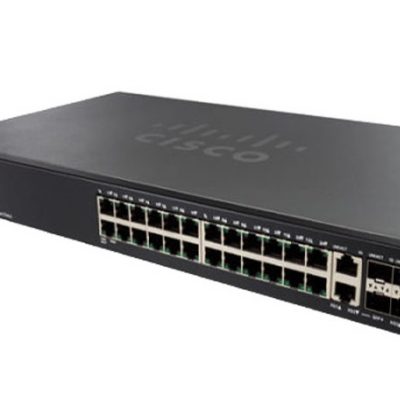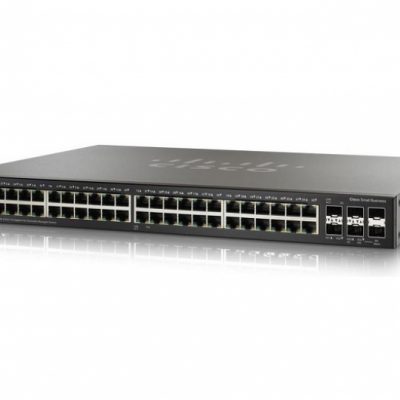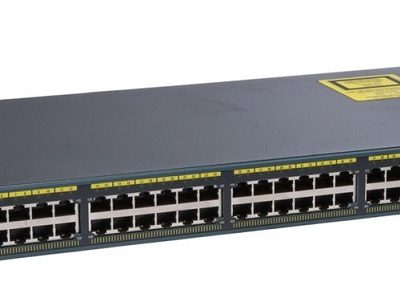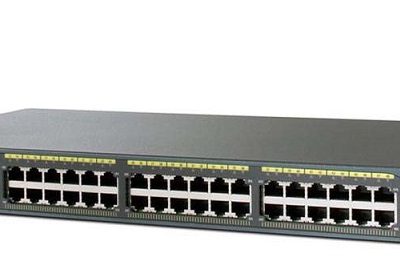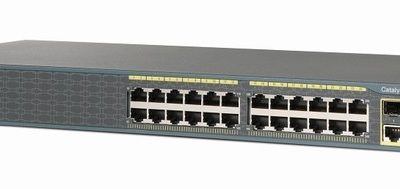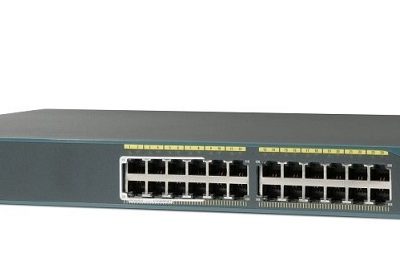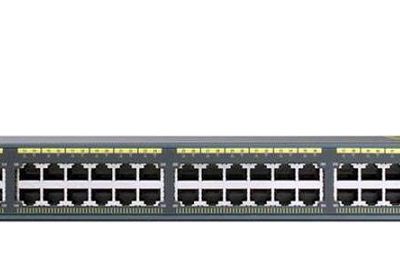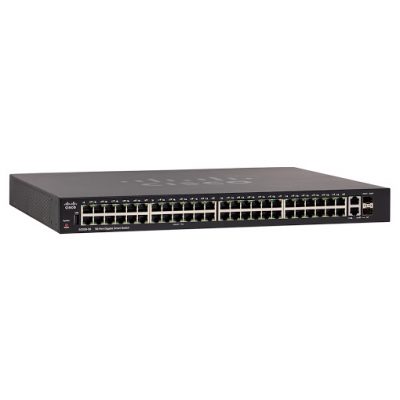Email: quangmaico@quangmai.net - quangmaico@gmail.com
Mô tả
Switch Cisco Smart SG200-18 (SLM2016T-EU) 18 cổng Gigabit
Thiết bị chia mạng Cisco Smart Gigabit Switch SG200-18 (SLM2016T-EU) 18 cổng Gigabit
| Performance | Capacity in Mpps (64-byte packets): 26.78 |
| Switching Capacity in Gbps: 36.0 | |
| Layer 2 Switching | Spanning Tree Protocol: Standard 802.1d STP support |
| Fast convergence using 802.1w (Rapid Spanning Tree), enabled by default | |
| Port Grouping: Support for IEEE 802.3ad Link Aggregation Control Protocol | |
| – Up to 8 groups | |
| – Up to 4 ports per group with 16 candidate ports for each (dynamic) 802.3ad link aggregation | |
| VLAN: 16 VLANs supported | |
| Port-based and 802.1Q tag-based VLANs | |
| Voice VLAN: Voice traffic is automatically assigned to a voice-specific VLAN and treated with appropriate levels of QoS | |
| Internet Group Management Protocol Versions 1 and 2 Snooping: Internet Group Management Protocol limits bandwidth-intensive multicast traffic to only the requesters; supports 256 multicast groups | |
| Head-of-Line (HOL) blocking: Head-of-line blocking | |
| Security | IEEE 802.1X (Authenticator Role): RADIUS authentication and accounting, MD5 hash |
| Port Security: Locks MAC addresses to ports and limits the number of learned MAC addresses | |
| Storm Control: Broadcast, multicast and unknown unicast | |
| Quality of Service | Priority Levels: 4 hardware queues |
| Scheduling: Strict priority and weighted round-robin | |
| Queue assignment based on differentiated services code point (DSCP) and class of service (802.1p/CoS) | |
| Class of Service: Port based, 802.1p VLAN priority based, IPv4/v6 IP precedence/type of service (ToS)/DSCP based, Differentiated Services (DiffServ) | |
| Rate Limiting: Ingress policer, per VLAN and per port | |
| Standards | IEEE 802.3 10BASE-T Ethernet, IEEE 802.3u 100BASE-TX Fast Ethernet, IEEE 802.3ab 1000BASE-T Gigabit Ethernet, IEEE 802.3ad LACP, IEEE 802.3z Gigabit Ethernet, IEEE 802.3x Flow Control, IEEE 802.1D (STP), IEEE 802.1Q/p VLAN, IEEE 802.1w RSTP, IEEE 802.1X Port Access Authentication, IEEE 802.3af, RFC 768, RFC 783, RFC 791, RFC 792, RFC 793, RFC 813, RFC 879, RFC 896, RFC 826, RFC 854, RFC 855, RFC 856, RFC 858, RFC 894, RFC 919, RFC 922, RFC 920, RFC 950, RFC 951, RFC 1042, RFC 1071, RFC 1123, RFC 1141, RFC 1155, RFC 1350, RFC 1533, RFC 1541, RFC 1542, RFC 1624, RFC 1700, RFC 1867, RFC 2030, RFC 2616, RFC 2131, RFC 2132, RFC 3164, RFC 2618 |
| IPv6 | IPv6: IPv6 host mode |
| IPv6 over Ethernet | |
| Dual IPv6/IPv4 stack | |
| IPv6 neighbor and router discovery (ND) | |
| IPv6 stateless address auto-configuration | |
| Path maximum transmission unit discovery | |
| Duplicate address detection | |
| Internet Control Message Protocol version 6 | |
| IPv6 over IPv4 network with Intra-Site Automatic Tunnel Addressing Protocol support | |
| IPv6 QoS: Prioritize IPv6 packets in hardware | |
| Multicast Listener Discovery Snooping: Deliver IPv6 multicast packets only to the required receivers | |
| IPv6 Applications: Web, ping, Simple Network Time Protocol, Trivial File Transfer Protocol, RADIUS, syslog, DNS client | |
| IPv6 RFCs Supported: RFC 2463: ICMP version 6 | |
| RFC 3513: IPv6 address architecture | |
| RFC 4291: IPv6 addressing architecture | |
| RFC 2460: IPv6 specification | |
| RFC 2461: Neighbor discovery for IPv6 | |
| RFC 2462: IPv6 stateless address auto-configuration | |
| RFC 1981: Path maximum transmission unit discovery | |
| RFC 4007: IPv6 scoped address architecture | |
| RFC 3484: Default address selection mechanism | |
| RFC 4214: ISATAP tunneling | |
| RFC 4293: MIB IPv6: Textual conventions and general group | |
| RFC 3595: Textual conventions for IPv6 flow label | |
| Management | Web User Interface: Built-in switch configuration utility for easy browser-based device configuration (HTTP). Supports configuration, system dashboard, system maintenance and monitoring |
| Remote Monitoring: Embedded RMON software agent supports one RMON group (statistics) for enhanced traffic management, monitoring and analysis | |
| IPv4 and IPv6 Dual Stack: Coexistence of both protocol stacks to ease migration | |
| Firmware Upgrade: Web browser upgrade (HTTP) and TFTP | |
| Port Mirroring: Traffic on a port can be mirrored to another port for analysis with a network analyzer or RMON probe. Up to 4 source ports can be mirrored to one destination port. A single session is supported | |
| VLAN Mirroring: Traffic from a VLAN can be mirrored to a port for analysis with a network analyzer or RMON probe. Up to 4 source VLANs can be mirrored to one destination port. A single session is supported | |
| Dynamic Host Configuration Protocol (Options 66 and 67): Dynamic Host Configuration Protocol options facilitate tighter control from a central point (DHCP server) to obtain IP address, auto-configuration (with configuration file download) | |
| Text-Editable Config Files: Config files can be edited with a text editor and downloaded to another switch, facilitating easier mass deployment | |
| Smartports: Simplified configuration of QoS and security capabilities | |
| Cloud Services: Support for FindIT Network Discovery Utility | |
| Localization: Localization of GUI and documentation into multiple languages | |
| Other Management: HTTP, RADIUS, port mirroring, TFTP upgrade, DHCP client, BOOTP, SNTP, ping, syslog | |
| Power Efficiency | Energy Detect: Automatically turns off power on Gigabit Ethernet RJ-45 port when the switch detects a link down |
| Active mode is resumed without loss of any packets when the switch detects the link is back up | |
| Cable Length Detection: Adjusts the signal strength based on the cable length. Reduces the power consumption for cables shorter than 10 m | |
| General Features | Jumbo Frames: Frame sizes up to 10 KB supported on Gigabit interfaces |
| MAC Table: Up to 8000 MAC addresses | |
| Discovery | Link Layer Discovery Protocol (802.1ab) with LLDP-MED Extensions: Link Layer Discovery Protocol allows the switch to advertise its identification, configuration and capabilities to neighboring devices, which store the data in an MIB. LLDP-MED is an enhancement to LLDP that adds the extensions needed for IP phones |
| Cisco Discovery Protocol: The switch advertises itself using the Cisco Discovery Protocol | |
| Power Consumption | Power Savings Mode: Energy Detect (link down), short reach |
| Power Consumption Worst Case: 110V/P=22.4W | |
| 220V/P=22.9W | |
| Heat Dissipation (BTU/hr): 78.2 | |
| Ports | Total system ports: 18 Gigabit Ethernet |
| 16 Gigabit Ethernet RJ-45 ports | |
| 2 Gigabit Ethernet combo mini-GBIC ports (RJ-45 + SFP) 1 | |
| Buttons | Reset button |
| Cabling Type | Unshielded twisted pair Category 5 or better for 10BASE-T/100BASE-TX; Unshielded twisted pair Category 5 Ethernet or better for 1000BASE-T |
| LEDs | System, Link/Act, Speed |
| Flash | 16 MB |
| CPU | 128 MB memory |
| Packet Buffer Memory | 4 MB |
| Power Supply | 100V-240V, 1.0-0.5A, 50-60 HZ |
| MTBF | @ 40°C (hours): 68,033 |
| Certifications | UL (UL 60950), CSA (CSA 22.2), CE mark, FCC Part 15 (CFR 47) Class A |
| MINIMUM REQUIREMENTS | Web Browser: Mozilla Firefox version 2.5 or later; Microsoft Internet Explorer version 6 or later |
| Category 5 Ethernet network cable | |
| TCP/IP, network adapter and network operating system (such as Microsoft Windows, Linux, or Mac OS X) installed on each computer in the network | |
| Dimensions (DxWxH) | 7.99 x 17.35 x 1.74′ (202.82 x 440.6 x 44.19 mm) |
| Weight | 4.43 lb (2.01 kg) |


